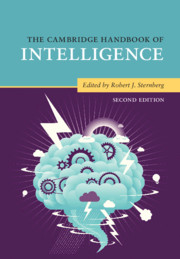Book contents
- The Cambridge Handbook of Intelligence
- The Cambridge Handbook of Intelligence
- Copyright page
- Dedication
- Contents
- Figures
- Tables
- Contributors
- Preface
- Part I Intelligence and Its Measurement
- Part II Development of Intelligence
- Part III Intelligence and Group Differences
- Part IV Biology of Intelligence
- Part V Intelligence and Information Processing
- 20 Basic Processes of Intelligence
- 21 Working Memory and Intelligence
- 22 Intelligence and Reasoning
- 23 Problem-Solving and Intelligence
- 24 Intelligence and Decision-Making
- 25 Artificial Intelligence
- 26 Intelligence and Video Games
- Part VI Kinds of Intelligence
- Part VII Intelligence and Its Role in Society
- Part VIII Intelligence and Allied Constructs
- Part IX Folk Conceptions of Intelligence
- Part X Conclusion
- Author Index
- Subject Index
- References
23 - Problem-Solving and Intelligence
from Part V - Intelligence and Information Processing
Published online by Cambridge University Press: 13 December 2019
- The Cambridge Handbook of Intelligence
- The Cambridge Handbook of Intelligence
- Copyright page
- Dedication
- Contents
- Figures
- Tables
- Contributors
- Preface
- Part I Intelligence and Its Measurement
- Part II Development of Intelligence
- Part III Intelligence and Group Differences
- Part IV Biology of Intelligence
- Part V Intelligence and Information Processing
- 20 Basic Processes of Intelligence
- 21 Working Memory and Intelligence
- 22 Intelligence and Reasoning
- 23 Problem-Solving and Intelligence
- 24 Intelligence and Decision-Making
- 25 Artificial Intelligence
- 26 Intelligence and Video Games
- Part VI Kinds of Intelligence
- Part VII Intelligence and Its Role in Society
- Part VIII Intelligence and Allied Constructs
- Part IX Folk Conceptions of Intelligence
- Part X Conclusion
- Author Index
- Subject Index
- References
Summary
In this chapter we discuss the link between intelligence and problem-solving. To preview, we argue that the ability to solve problems is not just an aspect or feature of intelligence – it is the essence of intelligence. We briefly review evidence from psychometric research concerning the nature of individual differences in intelligence, and then review evidence for how intelligence relates to complex problem-solving. We also consider the question of what mechanisms might underlie both problem-solving and intelligence, focusing on fluid intelligence and some of our own research on placekeeping ability. We then discuss the predictive validity of intelligence as it relates to job performance, mortality, expertise, and academic achievement. We also discuss practical uses of intelligence tests. Finally, we consider the question of whether intelligence as problem-solving ability can be improved through training. We close with directions for future research.
Keywords
- Type
- Chapter
- Information
- The Cambridge Handbook of Intelligence , pp. 553 - 579Publisher: Cambridge University PressPrint publication year: 2020
References
- 2
- Cited by



